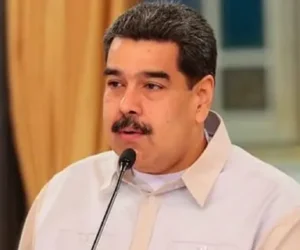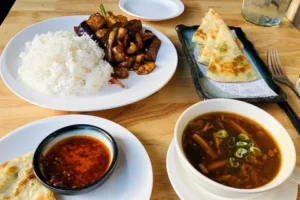Look, when you see Bianca Ojukwu walk into a room today as Nigeria’s Minister of State for Foreign Affairs, you’re seeing the culmination of one of the most extraordinary journeys in Nigerian public life. This is a woman who was crowned Most Beautiful Girl in Nigeria at 20, became the first African to win Miss Intercontinental, married the legendary Biafran leader Chukwuemeka Odumegwu Ojukwu despite a 30+ year age gap, served as ambassador to two countries, delivered that infamous slap to Ebelechukwu Obiano that went viral, and is now shaping Nigeria’s foreign policy. That’s not just a career – that’s a masterclass in reinvention and resilience.
I’m going to walk you through the complete story of Bianca Odinakachukwu Olivia Odumegwu-Ojukwu – from her childhood as the daughter of Governor C.C. Onoh, through her pageant years that made her an international star, her controversial marriage to a man three decades older, her transformation into a diplomat and politician, the controversies that have defined her public life, and her current role as one of President Tinubu’s most prominent ministers. This is the unfiltered truth about a woman who refuses to be defined by any single chapter of her remarkable life.
The Onoh Dynasty: Born Into Political Royalty
Bianca Odinakachukwu Olivia Onoh was born on August 5, 1968 (some sources say 1967), in Ngwo, Enugu State, Nigeria. She didn’t just grow up in a prominent family – she grew up in political royalty.
Her father, Chief Christian Chukwuma Onoh, was a larger-than-life figure who served as Governor of the old Anambra State (which included present-day Enugu State). Known for his flamboyant style and controversial politics, C.C. Onoh was not a man you could ignore. He was loud, wealthy, politically connected, and wielded enormous influence in Igboland.
Her mother, Carol Onoh, was a college principal – educated, refined, and the perfect complement to her husband’s bombastic personality. Carol represented the intellectual and cultured side of the family.
Bianca was the sixth of eight children in the Onoh household. Her siblings include:
- Lilian Onoh (who became Nigeria’s Ambassador to Namibia)
- Josephine Onoh
- Nuzo Onoh (horror novelist)
- Gabriel Onoh
- Stella Onoh
- Christian Onoh
- Dr. Josef Umunnakwe Onoh
Growing up as an Onoh in Enugu meant living in privilege, attending the best schools, being surrounded by political power brokers, and understanding from childhood that you were expected to achieve greatness. That kind of upbringing either crushes you with expectations or propels you to excellence. For Bianca, it was clearly the latter.
The British Education: Shaping a Global Perspective
Unlike many Nigerian elites who attended local schools before going abroad for university, Bianca’s international exposure began early.
Ackworth School, Pontefract, England:
A prestigious Quaker boarding school in West Yorkshire. This is where Bianca spent crucial formative years, developing not just academic excellence but also the poise, manners, and international perspective that would serve her throughout life.
St. Andrews College, Cambridge:
Continuing her British education, Bianca attended this respected Cambridge institution, further refining her academic credentials.
Cambridge Tutorial College:
Where she obtained her A-levels, completing her British secondary education with qualifications that would open doors to top universities.
University of Buckingham:
Bianca began a combined honours degree in Politics, Economics and Law at this private university. But her father had other plans.
The Transfer to University of Nigeria, Nsukka:
Chief C.C. Onoh, a lawyer himself, insisted Bianca focus solely on Law and return to Nigeria to complete her education at UNN. She graduated with an LL.B (Bachelor of Laws) degree in 1991.
Nigerian Law School, Lagos:
Like all aspiring Nigerian lawyers, Bianca completed the mandatory one-year program at Law School and was called to the Nigerian Bar in 1992.
Think about what this education represents: British boarding school refinement combined with Nigerian law credentials. International exposure mixed with local professional qualification. That combination would define her entire career – someone equally comfortable in London, Madrid, or Lagos.
1988: The Pageant That Changed Everything
At age 20, while still a law student, Bianca entered the Most Beautiful Girl in Nigeria (MBGN) pageant. This wasn’t just a beauty contest – MBGN was (and remains) Nigeria’s most prestigious pageant, a launching pad for careers in entertainment, business, and public life.
Most Beautiful Girl in Nigeria 1988:
Bianca won. Suddenly, this law student from a prominent political family was a national celebrity. Her intelligence, poise, beauty, and that distinctive Onoh confidence made her the perfect MBGN.
But winning MBGN was just the beginning.
Miss Africa 1989:
Representing Nigeria, Bianca won Miss Africa at the pageant held in The Gambia. She wasn’t just Nigeria’s beauty queen – she was Africa’s.
Miss Intercontinental 1989:
This is where Bianca made history. She became the first Nigerian and the first African ever to win Miss Intercontinental. This was a truly international pageant with contestants from dozens of countries, and this 21-year-old Nigerian law student beat them all.
Miss Congeniality – Miss Charm International, Russia:
Even at competitions where she didn’t win the crown, she won hearts, being named Miss Congeniality.
Miss World (Hong Kong) and Miss Universe (Mexico) Representative:
Following her MBGN win, Bianca represented Nigeria at both Miss World and Miss Universe – the two biggest pageants globally. While she didn’t win either crown, competing at that level brought international recognition.
By 1989, halfway through her reign as MBGN, Bianca was an international star. Her face was in magazines. She was traveling the world. Fame and opportunity were everywhere.
Then she met Odumegwu Ojukwu.
The Controversial Romance: When Beauty Met the Biafran Legend
In 1989, 21-year-old Bianca Onoh began a relationship with 56-year-old Chukwuemeka Odumegwu Ojukwu. Read that age gap again: he was 56, she was 21. He was old enough to be her father – actually, older than her father at the time of her birth.
Who Was Ojukwu?
Chukwuemeka Odumegwu Ojukwu wasn’t just another older man. He was living history. He had declared Biafra’s independence from Nigeria in 1967, leading the Igbo people through a devastating three-year civil war. He was a symbol of Igbo pride, resistance, and tragedy. He was controversial, charismatic, and larger than life.
He was also a close political associate of Bianca’s father, Governor C.C. Onoh. That’s how they met – through family political connections.
The National Scandal:
When news of their relationship broke, Nigeria exploded with opinions. A beauty queen in her prime with Nigeria’s most controversial political figure? A 21-year-old with a 56-year-old? The daughter of a governor with a man who had led a secessionist war?
The media couldn’t stop talking about it. Critics called it everything from inappropriate to opportunistic. Defenders called it true love transcending age. Nobody was neutral.
The Pressure:
Even Bianca’s father, who had introduced them, reportedly opposed the relationship due to the age gap and Ojukwu’s controversial profile. The pressure of being under constant public scrutiny became unbearable for young Bianca.
In a stunning move, Bianca resigned as Miss Intercontinental. She gave up the crown, the opportunities, the international platform – all because she wanted to complete her law degree without the constant media circus surrounding her relationship.
Think about what that decision shows: at 21, with the world at her feet, she chose education and love over fame. That’s not what most 21-year-old beauty queens do.
November 12, 1994: The Wedding of the Decade
On November 12, 1994, 26-year-old Bianca Onoh married 61-year-old Chukwuemeka Odumegwu Ojukwu in what was described as one of the most lavish wedding ceremonies ever held in Abuja.
This wasn’t a quiet registry wedding. This was a statement. Political heavyweights, military generals, business moguls, Nollywood stars, traditional rulers – everyone who was anyone attended. The wedding was a who’s who of Nigerian power, and it symbolized the union of two of Nigeria’s most prominent Igbo families.
The Marriage:
For 17 years (1994-2011), Bianca was Mrs. Odumegwu-Ojukwu, wife of the Ikemba Nnewi (Great Leader of Nnewi). She stood by Ojukwu through his various political ambitions, including his presidential runs on the All Progressives Grand Alliance (APGA) platform.
The Children:
The couple had three children:
- Chineme Ojukwu
- Afamefuna Ojukwu
- Nwachukwu Ojukwu
Some sources indicate Chineme and Afamefuna are twins. All three children were raised with the understanding that they carried the Ojukwu legacy – a heavy burden for any child.
What Made the Marriage Work?
Critics who predicted the marriage would fail based on the age gap were proven wrong. By all accounts, Bianca and Ojukwu had a genuine partnership. She became his closest advisor, his defender, his companion. He provided her with political education, connections, and unwavering support for her ambitions.
When people asked how the marriage survived despite the age difference, Bianca would later explain that maturity, shared values, and mutual respect mattered more than age.
November 26, 2011: When Ojukwu Died
On November 26, 2011, at age 78, Chukwuemeka Odumegwu Ojukwu died in a London hospital after a prolonged illness. Bianca was 43, suddenly a widow after 17 years of marriage.
The Will Controversy:
Ojukwu’s death triggered one of Nigeria’s most publicized inheritance disputes. His will left the majority of his assets to Bianca, sparking immediate controversy and disaffection among several Ojukwu family members who felt entitled to more.
Some family members contested the will, questioning its validity and fairness. The disputes played out publicly, with accusations of manipulation, greed, and disrespect flying in multiple directions.
Bianca’s Response:
Bianca appealed to critics to allow Ojukwu to “rest in peace,” describing him as a man of honour and integrity whose legacy should not be obscured by inheritance squabbles. She maintained that she was simply honoring her late husband’s wishes as expressed in his legal will.
The inheritance battle revealed the darker side of Nigerian high-society deaths – when prominent figures die, the vultures circle, and families that presented united fronts publicly turn savage in private.
The Diplomatic Career: From Widow to Ambassador
Rather than retreat into private grief, Bianca Ojukwu transformed her loss into public service.
2011: Senior Special Assistant on Diaspora Affairs
President Goodluck Jonathan appointed her as Senior Special Assistant on Diaspora Affairs, recognizing her international experience and connections.
2012-2015: Ambassador to Ghana
Bianca became Nigeria’s Ambassador to Ghana, her first major diplomatic posting. She worked on strengthening Nigeria-Ghana relations, addressing bilateral trade issues, and supporting the Nigerian diaspora community in Ghana.
2012-2015: Ambassador to Spain
She was also appointed Nigeria’s Ambassador to the Kingdom of Spain, where she served with distinction. Her tenure focused on economic diplomacy, cultural exchange, and tourism promotion.
Permanent Representative to UNWTO:
Bianca served as Nigeria’s Permanent Representative to the United Nations World Tourism Organization (UNWTO), promoting Nigeria’s tourism potential on the global stage.
Academic Enhancement:
While serving in Spain, Bianca wasn’t resting on her laurels. In 2016, she received a Master’s degree in International Relations and Diplomacy from Alfonso X el Sabio University in Spain.
She also holds:
- Diploma in Human Rights and International Relations from Berg Institute
- Diploma in Dynamics of Conflict and Cooperation from University for Peace, Costa Rica
Think about that: while working as an ambassador, she was simultaneously pursuing graduate education in diplomacy. That’s serious commitment to professional development.
Awards and Recognition:
- 2014: Voted Africa’s Outstanding Ambassador by Dutch magazine The Voice
- Certificate of Merit: From El Mundo Diplomatico for Nigeria-Spain engagement
- 2016: “Ambassador of Excellence” Award from Anambra State Government
The Business Empire: Beyond Politics
Bianca Ojukwu isn’t just a politician and diplomat – she’s a successful businesswoman.
BiancaBlend Products Ltd.:
Her cosmetics company, established in the 1990s. Despite initial reservations about modeling, Bianca fronted print commercials for her own brand, understanding that her face was her best marketing asset.
Mirabella:
Her interior decorating outfit, providing high-end design services to Nigeria’s elite.
Hope House Trust:
A non-governmental organization Bianca established focused on rehabilitating juvenile offenders in Enugu. This shows her commitment to social welfare beyond just business and politics.
Managing these businesses while simultaneously pursuing diplomatic and political careers demonstrates extraordinary organizational skills and work ethic.
March 17, 2022: The Slap Heard Round Nigeria
On March 17, 2022, at Governor Charles Soludo’s inauguration ceremony in Anambra State, something happened that would dominate Nigerian social media for weeks: Bianca Ojukwu slapped Ebelechukwu Obiano, the outgoing First Lady.
What Happened:
According to multiple witnesses and video footage, Ebelechukwu Obiano approached Bianca during the ceremony and made provocative comments. The exact words vary by account, but all agree that Ebele was confrontational.
Bianca responded by slapping her. At a state function. On live video. With dignitaries including governors, senators, and traditional rulers watching.
Security immediately intervened, separating the women.
The Backstory:
The bad blood between them stemmed from political rivalries. Bianca’s late husband founded APGA, the party that had governed Anambra for years. Willie Obiano (Ebele’s husband) was APGA governor but had fallen out with key party figures including those close to the Ojukwu legacy.
There were also reports that Ebele had made disparaging comments about Bianca and her late husband in the past.
The Aftermath:
Nigerian social media exploded. #BiancaOjukwu trended for days. Memes, think pieces, hot takes – everyone had an opinion.
Some defended Bianca: “She was provoked. You can’t disrespect Ojukwu’s widow at a public event and expect no consequences.”
Others criticized her: “This is unbecoming of an ambassador and potential minister. Violence is never the answer.”
The incident revealed that beneath Bianca’s diplomatic polish and refined exterior, she’s still an Igbo woman who won’t tolerate disrespect – especially regarding her late husband’s memory.
November 4, 2024: Minister of State for Foreign Affairs
On October 23, 2024, President Bola Ahmed Tinubu announced a cabinet reshuffle. Among the new appointments: Bianca Odumegwu-Ojukwu as Minister of State for Foreign Affairs.
On November 4, 2024, she was officially sworn in.
What This Position Means:
As Minister of State for Foreign Affairs, Bianca works alongside the full Minister of Foreign Affairs (currently Yusuf Tuggar), focusing on specific aspects of Nigeria’s foreign policy, diplomatic relations, and international engagement.
Her portfolio likely includes:
- Nigeria’s relations with European nations (given her Spain experience)
- Tourism diplomacy through her UNWTO connections
- Diaspora engagement building on her previous role
- Cultural diplomacy leveraging her international profile
Why Tinubu Chose Her:
- Proven diplomatic experience: Ambassador to two countries
- International credibility: Respected in diplomatic circles
- Political symbolism: APGA figure in APC government shows inclusivity
- Southeast representation: Addresses concerns about Igbo inclusion
- Competence: Track record of actual achievement, not just political connection
At 56 years old (turning 57 in August 2025), Bianca brings maturity, experience, and international networks to the role.
The Legacy Question: What Does Bianca Actually Represent?
Bianca Ojukwu biography is ultimately about reinvention and refusing to be limited by others’ expectations.
She was expected to be just a beauty queen – she became a lawyer.
She was expected to be just Ojukwu’s young wife – she became his partner and political equal.
She was expected to fade after his death – she became an ambassador.
She was expected to be defined by that slap – she became a federal minister.
At every turn, she’s exceeded expectations and refused to be boxed into single identity.
The Bottom Line:
From beauty queen to minister, from governor’s daughter to ambassador’s wife to ambassador herself, from businesswoman to diplomat to politician – Bianca Ojukwu has lived multiple lives, each one building on the previous, each one defying those who doubted her.
At 56, serving as Minister of State for Foreign Affairs, she’s still writing new chapters. And if her past is any indication, those chapters will continue surprising us.








